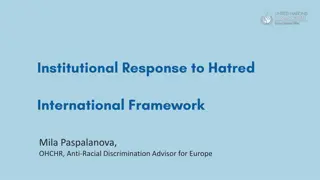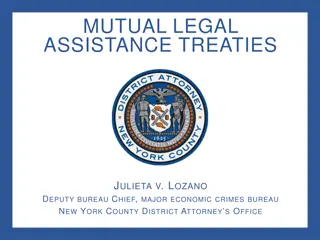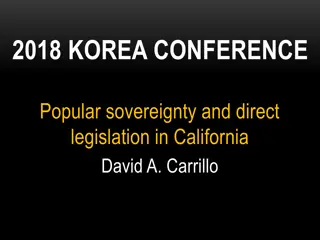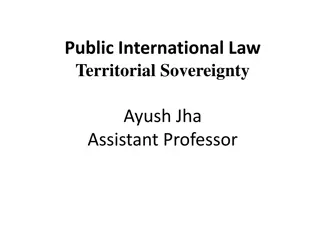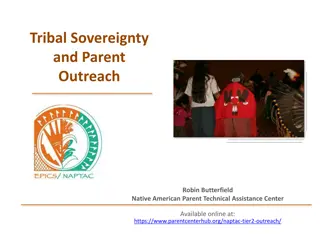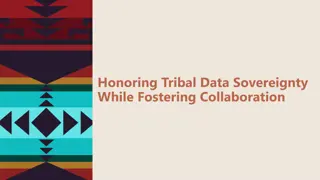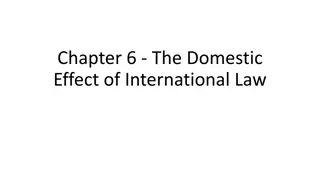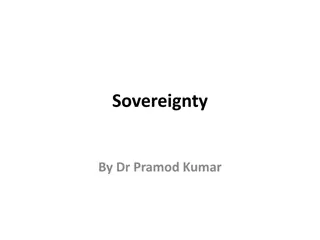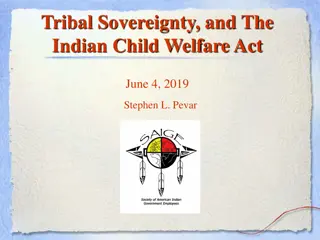Understanding Treaties and Sovereignty of the Grand Ronde People
The Grand Ronde people had rights established through treaties with the U.S. government, aiming to preserve their land, way of life, and self-governance. These treaties were essential for maintaining sovereignty and peaceful coexistence. However, over time, these rights were taken away through termination policies, leading to loss of federal aid and services, impacting their livelihood and well-being significantly.
Download Presentation

Please find below an Image/Link to download the presentation.
The content on the website is provided AS IS for your information and personal use only. It may not be sold, licensed, or shared on other websites without obtaining consent from the author. Download presentation by click this link. If you encounter any issues during the download, it is possible that the publisher has removed the file from their server.
E N D
Presentation Transcript
Treaties & Termination What were the rights of the Grand Ronde people and how did they get taken away?
Vocabulary Treaties: Treaties are legal agreements between nations. Both nations agree or promise to follow what is written in the agreement. Rights: freedoms protected by laws and treaties Sovereignty: the act of having independent power, political, social and economic, or being free Termination: the immediate withdrawal of all federal aid, services, and protection, as well as the end of reservations Hearings: meeting or session of a Senate, House, joint, or special committee of Congress Poverty: not having enough money for basic needs such as food, drinking water, shelter or toiletries Substance Abuse: a pattern of harmful use of any substance for mood-altering purposes, including alcohol or drugs
Treaties & Rights The Confederated Tribes of Grand Ronde have 7 Treaties: Treaty with the Umpqua-Cow Creek Band 1853 Treaty with the Rogue River 1853 Treaty with the Rogue River 1854 Treaty with the Chasta 1854 Treaty with the Umpqua and Kalapuya,1854 Treaty with the Kalapuya etc. 1855 Treaty with the Molala 1855 These treaties were written as agreements between the Tribes and the United States Government. The treaties were written to help Indians keep certain rights. The Indians wanted to preserve the land in order to keep their usual way of life.
Why were treaties written? The Tribes made treaties to: The U.S. Government made treaties to: Reserve portions of their land, creating a reservation. Get land from the Indians (for settlers-surplus land). Maintain the right to decide their own government. Keep the peace. Maintain the right to determine how their own land is used. Be able to trade with tribes. Maintain hunting, fishing, and gathering rights. Set up reservations. Identify and define the rights of both nations. End wars. Deal with non-Indians on an equal basis. Establish the borders for their nations. Be able to trade with other tribes and non-Indians. Build friendship between nations.
Who do you think treaties were more important for?
A Sovereign Nation In order for the U.S. government to work with the Oregon tribes it was agreed that a special relationship was needed. They developed a sovereign nation relationship that still exists today. Sovereign or sovereignty means having independent power; free; having the right to self- government. Tribes are sovereign nations. Tribes are known as a nation within a nation because the tribes are within the United States. Approximately 800 treaties were signed between Indians and non- Indian nationals by 1871. Over 500 of these treaties have been signed with the United States.
The Western Oregon Indian Termination Act August 13, 1954 - Public Law 588, Western Oregon Indian Termination Act was signed into law by President Dwight D. Eisenhower. This act terminated the Tribes federal recognition and removed all agreements that had been negotiated through treaties between the United States government and the Confederated Tribes of Grand Ronde. 1954 63 tribes total were terminated in Oregon. More tribes were terminated in Western Oregon than any other region of the U.S.
Tribal vs. Common histories state that Western Oregon Tribes agreed to termination. However, the Tribes did not agree to termination. U.S. Government Perspectives Oral accounts from Grand Ronde Elders stated that the Tribe did not consent. Tribal Elders stated that they had no knowledge of the hearings regarding Termination in Washington, D.C. They had no idea that Termination was being discussed. No vote about the 1953 Termination draft document ever occurred and Indian Superintendent E. Morgan Pryse admitted that there were people who did not agree with the termination. Why would U.S. history tell everyone that the Tribes agreed to termination?
The Effects of Termination What happened after The Western Oregon Termination Act was signed into law? The Tribe lost all its treaty rights and land (ili i). The Reservation was closed in 1956 and services were withdrawn. Tribal members scattered throughout the country Some Tribal members remained in the area but life was extremely difficult Terminated Indians were like new immigrants to America - with no resources, no savings, and little help from the government. Grand Ronde lands were sold, the average payout was $35 per person. Most Tribal members were forced to relinquish their allotments lands (property) as they did not have the funds to buy them from the government. Some tribal members were able to purchase their property and stay in Grand Ronde.
It changed our lives. Things weren t the same after that. At the stroke of a pen they wiped us away. Margaret Provost, Grand Ronde Tribal Elder
Post-Termination Era (1956-1983) Termination caused great hardships for many Oregon Indians including the Grand Ronde. Some Tribal members remained in the Grand Ronde area. Finding jobs was extremely difficult Poverty, substance abuse, and all of the associated problems were normal in Tribal families but now they were worse than ever before. Some families found ways to preserve their culture and history, others were lost to the Tribe forever. Many cultures and languages of the Grand Ronde Tribe declined. With the loss of the Reservation, the community lost its community center and many became adrift in society.
What was not lost? Hunting & Fishing Rights: The treaties did not address fishing rights and termination did not address fishing rights. The Cemetery: The Tribe had the cemetery that remained community property. They had administrative rights over that property. Culture: Some members did retain their culture and their association with the families that remained in Grand Ronde.
Termination-Jenness 2012-2.mov Confederated Tribes of Grand Ronde Elder, Margaret Provost, talks about living through termination.
Reflection Questions: What did you learn from the video? What do you think it would be like to be told you are no longer an Indian? How would it feel to have your family scattered, living apart from one another? Why do you think the Federal government terminated the Tribes and did they think about the impact it would have before doing so?


